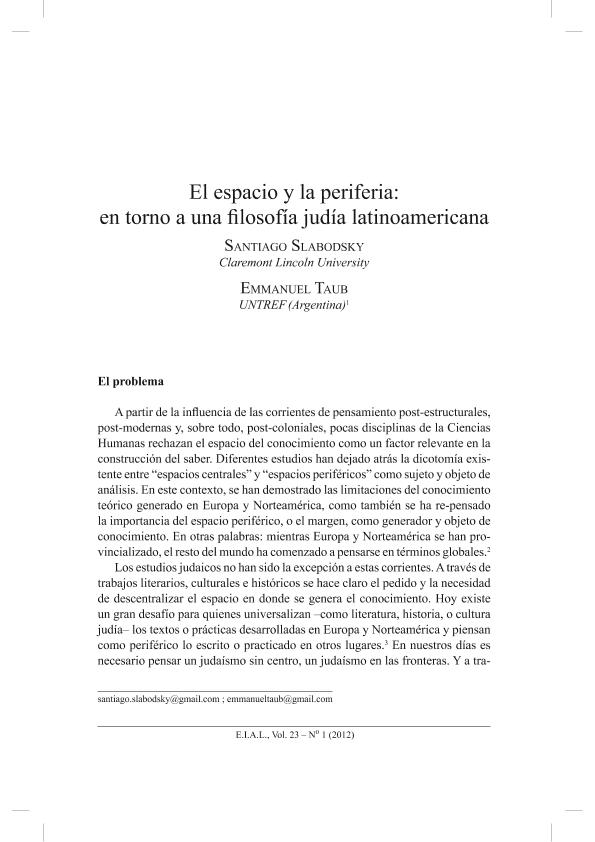Mostrar el registro sencillo del ítem
dc.contributor.author
Slabodsky, Santiago
dc.contributor.author
Taub, Emmanuel

dc.date.available
2023-05-05T14:11:10Z
dc.date.issued
2012-06
dc.identifier.citation
Slabodsky, Santiago; Taub, Emmanuel; El espacio y la periferia: En torno a una filosofía judía latinoamericana; Universidad de Tel Aviv. Escuela de Historia. Instituto Sverdlin de Historia y Cultura de América Latina; Estudios Interdisciplinarios de América Latina y el Caribe; 23; 1; 6-2012; 61-75
dc.identifier.issn
0792-7061
dc.identifier.uri
http://hdl.handle.net/11336/196425
dc.description.abstract
A partir de la influencia de las corrientes de pensamiento post-estructurales,post-modernas y, sobre todo, post-coloniales, pocas disciplinas de la Ciencias Humanas rechazan el espacio del conocimiento como un factor relevante en la construcción del saber. Diferentes estudios han dejado atrás la dicotomía exis- tente entre “espacios centrales” y “espacios periféricos” como sujeto y objeto de análisis. En este contexto, se han demostrado las limitaciones del conocimiento teórico generado en Europa y Norteamérica, como también se ha re-pensado la importancia del espacio periférico, o el margen, como generador y objeto de conocimiento. En otras palabras: mientras Europa y Norteamérica se han pro- vincializado, el resto del mundo ha comenzado a pensarse en términos globales.
dc.description.abstract
In this article we explore the possibilities of developing a Latin American Jewish Philosophy in four steps. First we unfold the disciplinary limitations that both limited the emergence of the field and also set the current conceptual-historical basis for the area. Second we explore a possible historical departing point for the field. We survey conversations between European and Latin American philosophies that can offer an excellent prescriptive historical opening for the area. Third we explore the conceptual possibility of leaving behind the centrality of the object to privilege the space as unit of analysis. We argue this is a conceptual need to acknowledge the importance of unfolding a Latin American Jewish Philosophy. Finally, after surfing possibilities and limitations as well as the historical and conceptual basis for the field, we finish reflecting in the hybrid nature and set the departing points for further research.
dc.format
application/pdf
dc.language.iso
spa
dc.publisher
Universidad de Tel Aviv. Escuela de Historia. Instituto Sverdlin de Historia y Cultura de América Latina
dc.rights
info:eu-repo/semantics/openAccess
dc.rights.uri
https://creativecommons.org/licenses/by-nc-sa/2.5/ar/
dc.subject
FILOSOFÍA JUDÍA
dc.subject
AMÉRICA LATINA
dc.subject
ESPACIO
dc.subject
PERIFERIA
dc.subject.classification
Otras Ciencia Política

dc.subject.classification
Ciencia Política

dc.subject.classification
CIENCIAS SOCIALES

dc.title
El espacio y la periferia: En torno a una filosofía judía latinoamericana
dc.type
info:eu-repo/semantics/article
dc.type
info:ar-repo/semantics/artículo
dc.type
info:eu-repo/semantics/publishedVersion
dc.date.updated
2023-05-05T12:54:39Z
dc.identifier.eissn
2226-4620
dc.journal.volume
23
dc.journal.number
1
dc.journal.pagination
61-75
dc.journal.pais
Israel

dc.journal.ciudad
Tel Aviv
dc.description.fil
Fil: Slabodsky, Santiago. Claremont Lincoln University; Estados Unidos
dc.description.fil
Fil: Taub, Emmanuel. Universidad Nacional de Tres de Febrero. Centro de Estudios sobre Genocidio; Argentina. Consejo Nacional de Investigaciones Científicas y Técnicas; Argentina
dc.journal.title
Estudios Interdisciplinarios de América Latina y el Caribe

dc.relation.alternativeid
info:eu-repo/semantics/altIdentifier/url/https://eial.tau.ac.il/index.php/eial/article/view/303
Archivos asociados
